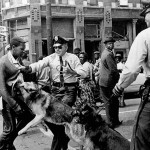Christians as Oppressed Now as Blacks Under Jim Crow?

Click here for Part 1 of David Frum's review of Angelo Codevilla's "The Ruling Class".
What can we learn from the new Rush Limbaugh endorsed book, "The Ruling Class," by Angelo Codevilla? This morning I detailed four observations. Here are two more.
5) If one idea unites "The Ruling Class" it is Codevilla's conviction that white Christians are targets of oppression and discrimination fully equal to that which ever oppressed black Americans. Thus Codevilla asserts that today's ruling class "can no more believe that a Christian might be their intellectual and moral equal than white southerners of the Jim Crow era could think the same of Negroes." (22) And he contends that Reconstruction after the Civil War was fully as evil as the slavery that preceded the war. Both slavery and Reconstruction followed from the Ruling Class idea that it is right for "superior men to subdue inferior ones, just as they subdue lower beings, or try to improve them as they please. Hence, while it pleased the abolitionists to believe in freeing Negroes and improving them, it also pleased them to believe that Southerners had to be reconstructed and improved by force. In short, Darwinism corrupted Northern and Southern thinkers equally."
Tea Party Americans are enraged when liberals discern anything racial in their politics. They do not favor discrimination in any form, their movement is open to all, how dare you accuse us?
But here's a curious fact about Codevilla's book. Through "The Ruling Class," Codevilla repeatedly estimates that 1/3 of the country follows "The Ruling Class" while 2/3 belong to the good-guy faction, "the Country Party." Who are these bad 1/3? They cannot all be Stanford graduates.
Here's why Codevilla gets coy. He notes that the Democratic party's most loyal voters live on streets named after Martin Luther King. They are unwed parents. They are protected by the Community Reinvestment Act.
Codevilla's story never explicitly acknowledges race, but it is unmistakably racialized. If Christian whites are America's new Negroes, what happened to the old Negroes? Apparently they joined the Ruling Class.
In this regard, Codevilla's 2/3 vs. 1/3 division of the country begins to look less like a morale-boosting attempt to conjure up a majority for his preferred side of the argument -- and more like a tally of the proportion of whites and non-whites in the voting age population.
6) Perhaps the most surprising thing about Codevilla's book is the absence of much in the way of a political program. It wants constitutionalism and lower taxes and less spending and less debt, which is all fine. But if you were a Tea Party politician looking for answers to the question, "What do we do?" you won't find those answers here. Surprisingly, Codevilla more or less washes his hands of both politics and policy.
For the Country Class, winning elections will be the easy part. Avoiding bitter partisan govenment on the one hand, and co-optation into the Ruling Class on the other, will be harder. Harder yet will be sweeping away half a century's accretion of bad habits. Taking care to preserve the good among them is hard enough; establishing, even re-establishing, a set of better institutions and habits is much harder. The Country Class' greatest difficulty will be to enable a revolution to take place without imposing it. America has been imposed on enough.
And there the book ends.
It may seem a frustrating and disappointing end point. Having told people everything that is wrong with America - identified the guilty parties to be removed - promised that it will be easy to take power - you quit without advising them what to do if they should happen to gain power. How is that helpful?
The answer is that "The Ruling Class" is not a book about governing. It's a book about feeling: about identifying targets for blame, about mobilizing anger against those targets, about defining who is - and who is not - a proper American. The book does not aspire to be useful, but to be satisfying to those who feel most outraged and alienated.
Which brings us to the real division in America revealed by "The Ruling Class." Plainly, there are many people to whom this book offers a powerful and convincing message. And then there are those to whom it will appear an unsubstantiated, unconvincing mess.
Just speaking personally here, all the elements that I would expect to find in a book on this subject - some attempt to define basic concepts, some effort at proof, some attempt to justify intellectual moves like defining college professors INTO the "ruling class" and defining the CEOs of major corporations OUT - all these elements are missing.
Codevilla piles bare assertion atop bare assertion atop bare assertion, in service of a series of generalizations that will seem convincing only to those who believed them already. The "Ruling Class" is a work of prejudice-ratification, not analysis in any sense. And yet ... plainly there are plenty of people who ask nothing better from a book like this than prejudice-ratification. They know what they think, and what they want is somebody to reflect those thoughts back to them - only even more emphatic, even more impassionated, even more disdainful of anybody who might think differently.
If we were dividing America into segments, perhaps this would be as good a division as any: between those who live in the closed information system served by books like "The Ruling Class," and those who live in more open systems, where assertions must be corroborated, and where generalizations must rest on evidence.
That divide seems to gape especially wide these days, judging at least by the enthusiastic reception of this embittered polemic by so many who call themselves conservative.